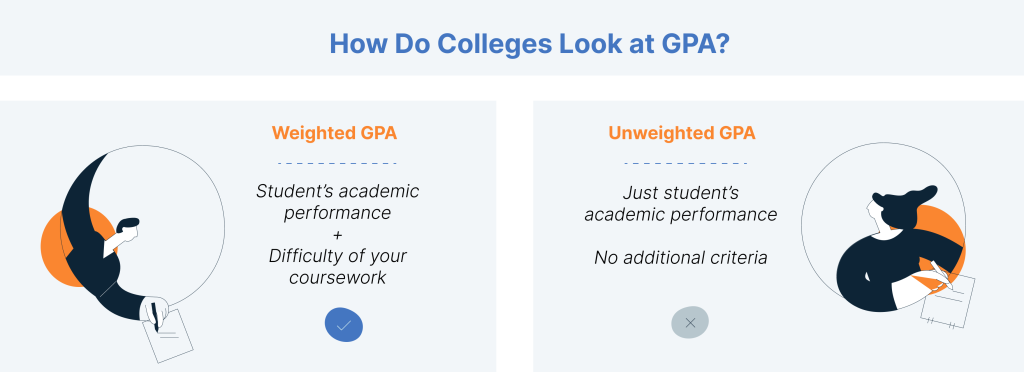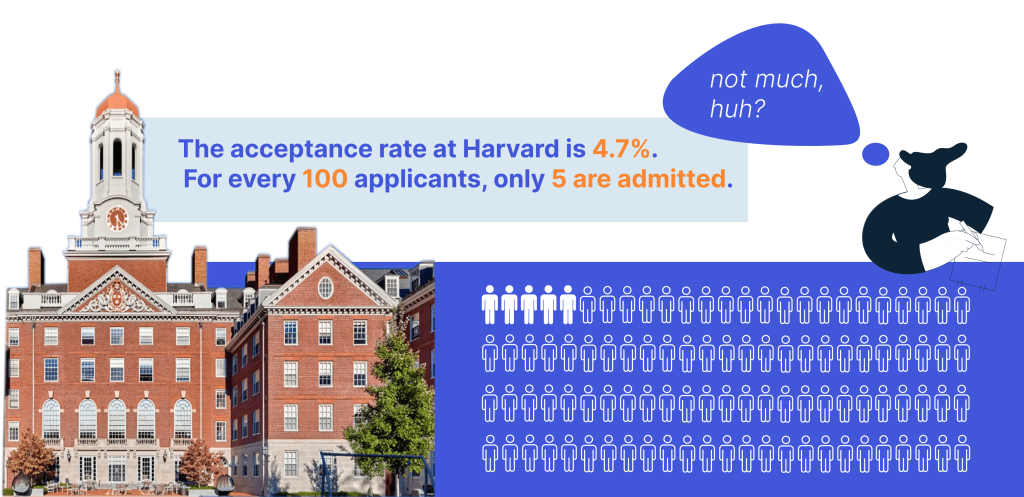Going to college is a pivotal event in a young adult’s life. It’s a fair chance to get a promising degree and build a better future for yourself, where you will have a good job with a stable income. However, to enter school and realize your dreams, you should fulfill a number of conditions. One of which is a sufficient grade point average (GPA). This raises the pressing question, “What GPA do colleges look at, and how important is it in the overall admissions process?” Today, you will learn the answer to this and other questions you may have concerning this issue.
What GPA Do Colleges Look At in the First Place?
In order to give you a detailed answer to the main question, we will begin with the simplest one. Let’s start with the primary answer to the main question: “What GPA do colleges look at?” The short answer is that colleges usually take into account your high school GPA. This is the average score you received throughout your years in high school. It usually ranges from 0 to 4. However, not everything is clear and straightforward.
Schools typically distinguish a cumulative (unweighted) grade point average and a weighted grade point average. There is a fundamental difference between them.
- The cumulative GPA is the arithmetic mean of all your grades in high school. All your grades for each course you took are summed up and divided by the number of classes. With this approach, advanced courses are not separated out.
- The weighted GPA takes into account the difficulty of the classes you took. Advanced courses are rated higher. That is, the maximum grade here is not 4.00 but 5.00. With this approach, students can significantly improve their grades by taking Advanced Placement (AP) or International Baccalaureate (IB) courses.
The pressing question of “What GPA do colleges look at?”
Given what we’ve already told you, the most logical answer to the question “What GPA do colleges look at?” is that the higher your GPAs, the better. This is the first thing you should focus on. A high grade point average lets the institution know you did not sit around at school but acquired the necessary knowledge. Moreover, it also indicates that you are a conscientious person who takes your responsibilities seriously.
How Do Colleges Look at GPA?
The key fact about GPAs is that universities care about their numeric score. However, their analysis does not end there. Beyond the overall numbers, they also want to see which courses you received a particular score for. So, what else do universities pay attention to besides dry grade point average numbers?
- Unweighted vs. weighted GPA. Colleges look at both weighted and unweighted GPAs. A weighted GPA is calculated based on the difficulty of your coursework. Additional weight is given to challenging academic-level courses, such as Advanced Placement (AP) or International Baccalaureate (IB) classes. An unweighted GPA considers all subjects equally.
- Course rigor. In addition to grades, schools pay attention to what courses you take. They want to know if you took advanced courses or just basic school ones. The complexity of the course is important to the admissions committee.
- Dynamics in grades. “What GPA do colleges look at?” Colleges pay great attention to the dynamics of your academic achievements. They value consistency and improvement. This aspect allows them to see how dedicated you have been to your studies and whether you have had any “down periods.”
- Contextual factors. Universities understand that not all high schools are created equal. College admissions officers take this into account. They consider each individual applicant and their GPA according to the resources they may have received at a particular high school.
- “What GPA does colleges look at?” Consistency. Many universities take a holistic approach to admissions. This means they consider your GPAs along with other factors. They also consider standardized test scores, essays, letters of recommendation, extracurricular activities, and volunteer work.

How Important Is GPA in College?
Undoubtedly, schools put a lot of weight on your grade point average when selecting you for admission. It is a direct indicator of your academic achievements. When analyzing it, admissions committees take into account its quantitative indicator, apart from the other factors we have described above. However, the importance of GPAs does not end there. How important is GPA in college? Extremely important. It opens the door to numerous opportunities.
Does GPA matter to get into college? GPA in college explained
The importance of the GPA cannot be overstated. In addition to its obvious purpose of opening up access to earning a coveted degree, a grade point average can also serve well in college.
- Admission criteria. While colleges consider a variety of factors, including participation in extracurricular activities and personal essays, grade point average remains the fundamental criterion when applying to any school. It provides admissions officers with a quick overview of your academic performance, helping them assess your readiness for school.
- Merit scholarships. A high GPA in college can open the door to merit scholarships. Many educational institutions offer such financial incentives to students with high academic achievements. This is an important source of additional funding that can ease the financial load of attending school.
- Graduate school. Does GPA matter in college? Yes, in addition to getting into an undergraduate program, your college GPA can affect your future educational plans. If you plan to pursue a master’s degree, you should keep this in mind. Universities take your college grade point average into account when making admissions decisions.
- Academic probation. Keep in mind that a low GPA holds equal weight to a high one but without benefit to you. Low GPAs can jeopardize your graduation. You may be placed on academic probation or even expelled.
How much does GPA matter for college?
“What GPA do colleges look at?” The importance of GPA for college admission can vary greatly. Highly selective universities have stricter grade point average requirements, while other schools take a more flexible approach. You should carefully study the information about the colleges you are interested in. This way, you will have complete information about their specific GPA expectations.
| The Ivy League Schools | Average GPA | Schools with low GPA requirements | Average GPA |
| Princeton University
Harvard University Yale University University of Pennsylvania Dartmouth College Brown University Cornell University Columbia University |
3.9
4.18 4.14 3.9 4.11 4.08 4.07 4.07 |
Southern University at New Orleans
Kentucky State University Alabama State University Shaw University Harris-Stowe State University Jarvis Christian College Texas Southern University Tennessee State University Voorhees College Bluefield State College |
2.8
2.9 2.95 2.98 3.0 3.0 3.0 3.0 3.0 3.1 |
At the same time, remember that your GPA is only part of your college application process. If your GPA is on the low end of the competitive range, you can try to compensate with a compelling essay and letters of recommendation.
Mind Your GPA for College Admissions
As already mentioned, GPA is a fundamental indicator that admissions committees pay attention to when evaluating an applicant. Therefore, you should try hard to achieve the required level. If you cannot calculate your grade point average yourself, there is a GPA calculator that will make this task easier for you.
Peculiarities of college admissions
When applying to college, you must ensure that all your documents are in order and well-prepared. This is especially true for the GPA report. Universities usually require an official grade point average report after the admission decision. In the Common Application, you may or may not indicate your score. This is not mandatory, but it is desirable for obvious reasons. To prepare your GPA report in the best possible way, follow the tips below.
- Get a transcript. Request official transcripts from your high school. They should include all of your school courses, grades, and credit hours earned.
- Convert grades if necessary. If your school uses a different grading system (e.g., percentages or a 10-point or 12-point scale), convert your grades to the standard 4.0 scale.
- Calculate your GPA.C Do colleges look at weighted GPAs? Yes, they do. Consider calculating both weighted and unweighted GPA, if applicable. A weighted GPA takes into account the difficulty of your courses, such as honors, AP, or IB courses. An unweighted GPA values all courses equally. Use the GPA calculator if needed.
- Calculate your cumulative GPA. Don’t forget the cumulative GPA, the total grade point average for each academic period or semester.
- Include all your classes. When calculating your GPA, make sure your high school transcript includes all the courses you took in high school, even if you dropped out or received a failing grade.
- Check for accuracy. Check your transcripts for errors. Make sure all grades, course titles, number of classes, and credit hours are correct.
- Note positive dynamics in your GPA. If your GPA for college admissions has improved over time, emphasize this positive trend in your report. This can demonstrate your commitment to academic growth.
- Check the requirements. Check the specific grade point average requirements for each college you are applying to. Some universities may have a minimum GPA threshold for admission or merit scholarships.
- Keep copies. You may need them for scholarship applications or for future reference.
“What GPA do colleges look at?” By submitting an accurate and complete report with a decent GPA, you will present yourself as a strong candidate for college admission.
Harvard admissions: Basic facts to consider
Harvard University is known worldwide for its exceptional academic reputation and influence. The school is an honorary member of the Ivy League. Harvard has a long and distinguished history of shaping education, research, and leadership in a variety of disciplines.
What GPA do colleges look for? If you want to get into a school as selective as Harvard, you have to try really hard. To have the perfect application with a high GPA, you need to start working on it long before your senior year. Harvard is a prestigious school and chooses only the strongest candidates for admission. If you are determined to apply here, your grade point average should be at least 4.18. If you do not reach this level, you can try to compensate for this with high SAT or ACT scores. To do this, you need to score 1580 or 35 points, respectively.

Key information you should know about Stanford admissions
Stanford University is in the heart of Silicon Valley. The world-renowned school is recognized for its groundbreaking research, entrepreneurial culture, and global influence. The university praises innovation and academic excellence.
Do colleges care about GPA? Stanford does. It accepts students only with the highest GPA scores and excellent SAT or ACT results. Although the university does not implicitly set minimum scores in the above-mentioned areas, Stanford students usually enter the university with such results: minimum 4.0 grade point average, SAT 1520, and ACT 34 points, respectively. If your dream is to study at Stanford, you must be well prepared because the admission rate for applicants is only 4% at this school.
